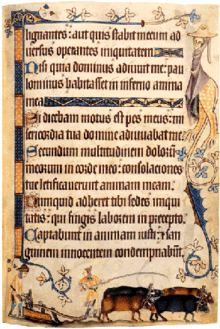
Back Пиърс Плауман Bulgarian Piers Plowman Catalan Piers Plowman Welsh Piers Plowman German Πιρς Πλόουμαν Greek Pedro el Labrador Spanish پییرز شخمزن Persian Pierre le laboureur French Piero l'Aratore Italian 농부 피어스의 꿈 Korean

Piers Plowman (written c. 1370–86; possibly c. 1377) or Visio Willelmi de Petro Ploughman (William's Vision of Piers Plowman) is a Middle English allegorical narrative poem by William Langland. It is written in un-rhymed, alliterative verse divided into sections called passus (Latin for "step").
Like the Pearl Poet's Sir Gawain and the Green Knight, Piers Plowman is considered by many critics to be one of the greatest works of English literature of the Middle Ages, preceding and even influencing Chaucer's Canterbury Tales. Piers Plowman contains the first known reference to a literary tradition of Robin Hood tales.[1][2]
There exist three distinct versions of the poem, which scholars refer to as the A-, B-, and C-texts. The B-text is the most widely edited and translated version; it revises and extends the A-text by over four thousand lines.[3]
- ^ Alfred Stapleton (1899). Robin Hood: the Question of His Existence Discussed, More Particularly from a Nottinghamshire Point of View. Sissons and son. pp. 17–.
- ^ John Paul Davis (20 July 2016). Robin Hood: The Unknown Templar. Peter Owen Publishers. pp. 21–. ISBN 978-0-7206-1865-5.
- ^ Simpson, James (2018). The Norton Anthology of English Literature: The Middle Ages (Tenth ed.). p. 388.
© MMXXIII Rich X Search. We shall prevail. All rights reserved. Rich X Search